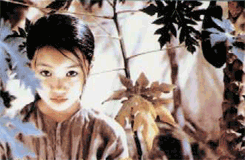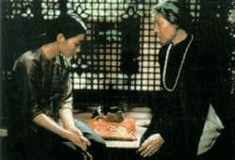The Scent of Green Papaya (Anh Hung Tran) 1994
 Anh Hung Tran’s The Scent of Green Papaya is a
film that appears so outwardly modest in its goals that it is easy to
underestimate it. In its own, nearly wordless, way it tells the story of Mui, a
poor Vietnamese girl that leaves her family (whom we never see) to act as a
middle-class family’s servant. Many of the film’s early scenes show us
Mui’s introduction to this new household, as she learns to cook and perform
her chores, and as the youngest son of the home taunts her. Mui’s character
remains relatively mute as she observes the world around her. The film watches
her as she delights as ants scurry to retrieve a piece of food, and then
contrasts that image with one that shows one of the sons as he drips hot wax
onto a group of ants. The moral seems pretty overt here: we should pause to
consider even the lowest members of society, rather than antagonize them.
Anh Hung Tran’s The Scent of Green Papaya is a
film that appears so outwardly modest in its goals that it is easy to
underestimate it. In its own, nearly wordless, way it tells the story of Mui, a
poor Vietnamese girl that leaves her family (whom we never see) to act as a
middle-class family’s servant. Many of the film’s early scenes show us
Mui’s introduction to this new household, as she learns to cook and perform
her chores, and as the youngest son of the home taunts her. Mui’s character
remains relatively mute as she observes the world around her. The film watches
her as she delights as ants scurry to retrieve a piece of food, and then
contrasts that image with one that shows one of the sons as he drips hot wax
onto a group of ants. The moral seems pretty overt here: we should pause to
consider even the lowest members of society, rather than antagonize them.
 Just as it begins to feel too simple for its own good,
however, the film leaps ahead ten years. The family, due to financial strain,
has to release Mui from their service, and she ends up working for a young
conservatory student. The film’s politics take on a new dimension here. We
notice that her new employer has an apartment that is decorated with western
artifacts. He studies at a French academy, where he plays the piano (The film
is, tellingly, a co-production of France and Vietnam.). This is in stark
contrast to the family that Mui previously worked for. Their music was played on
traditional Vietnamese instruments, and their home was a collection of antiques.
That the first household has failed becomes another bold political statement
here. That the film is able to fully convey political concerns without ever
actually having a character utter a word about politics is one of its
achievements. That it can do so while remaining completely within the context of
Mui’s simple life is sheer elegance. Its argument that even the most
nonpolitical citizens feel the impact of political change is given an uplifting
shot in the arm with the film’s ending.
Just as it begins to feel too simple for its own good,
however, the film leaps ahead ten years. The family, due to financial strain,
has to release Mui from their service, and she ends up working for a young
conservatory student. The film’s politics take on a new dimension here. We
notice that her new employer has an apartment that is decorated with western
artifacts. He studies at a French academy, where he plays the piano (The film
is, tellingly, a co-production of France and Vietnam.). This is in stark
contrast to the family that Mui previously worked for. Their music was played on
traditional Vietnamese instruments, and their home was a collection of antiques.
That the first household has failed becomes another bold political statement
here. That the film is able to fully convey political concerns without ever
actually having a character utter a word about politics is one of its
achievements. That it can do so while remaining completely within the context of
Mui’s simple life is sheer elegance. Its argument that even the most
nonpolitical citizens feel the impact of political change is given an uplifting
shot in the arm with the film’s ending.
The film deservedly won the Camera D’Or at Cannes. It's a
stunning first feature. There are many shots that combine several stunning
compositions with fluid camera motion. Every time the camera pauses, we expect
the shot to end, but it moves deeper into the frame to find something else to
look at. I find this sort of filmmaking, which is present in such films as
Tarkovsky’s The Mirror or Welles’ The Magnificent Ambersons,
somehow purer than most. This style is perfectly suited to a film that
slowly reveals layers that would not be apparent to those that were not willing
to look more closely at what’s on screen.
* * * 1/2
October, 2001
Jeremy Heilman